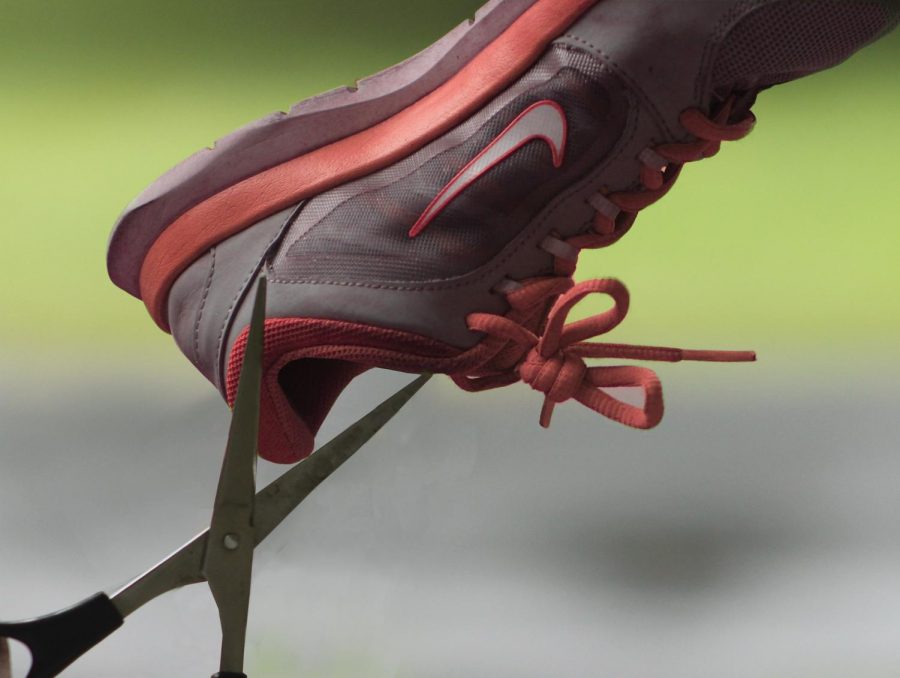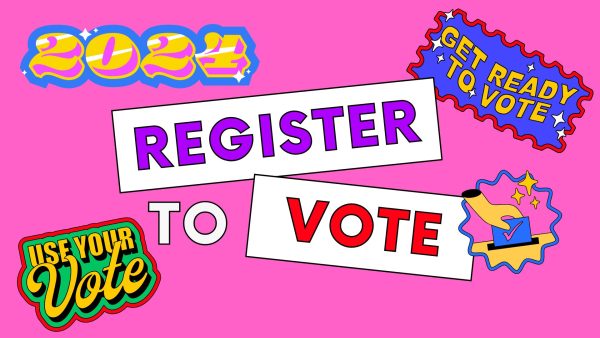Just Do It? Or, Just Don’t Do It?
The great Nike debate.
Photo by Elizabeth Niemiec
Where do you stand in the great Nike debate?
“Just Do It.” For thirty years this iconic line has been synonymous with Nike, arguably the most beloved athletic apparel and equipment company. Beloved that is, up until it’s latest promotion, when Nike found itself in the midst of a social media controversy. The culprit? Nike’s 30th anniversary commemoration of its famous slogan, titled “Dream crazy”, which features former San Francisco 49ers quarterback Colin Kaepernick as the leading face for the campaign.
Other athletes featured are tennis star Serena Williams, NBA player Lebron James, and NFL wide receiver Odell Beckham Jr. The campaign was first alluded to in a picture tweeted by Kaepernick on September 3rd, showing Kaepernick with the motto “Believe in something. Even if it means sacrificing everything,” written on top. The full campaign, first aired during the NFL season opening game on September 6th, revolves around the phrase “Don’t ask if your dreams are crazy. Ask if they’re crazy enough,” among other pieces of inspirational advice.
Kaepernick, who has become a leading figure of the protest against police brutality and other racial injustices, is credited with founding the Take A Knee movement. The movement began when a visit from Nate Boyer, a retired Green Beret, persuaded Kaepernick to begin to kneel while the National Anthem played before NFL games, as an act aimed to show his support for the Black Lives Matter movement and to bring attention to police brutality. Other players quickly followed suit to show their support. A national firestorm soon followed, and the movement received both support and criticism, dividing the league.
The biggest argument of disapproval centers around the idea that standing while the National Anthem is being played is an essential part of being American. By kneeling, you are showing disrespect to the flag, to the military, and are not proving allegiance to the country. Those that side this way insist all violators should be fired. But was the move ever meant to be disrespectful? Supporters point out that Kaepernick could have chosen to remain seated during the Star-Spangled Banner yet he opted to kneel instead, revealing that he had no disrespectful intentions to the country, only meaning to bring attention to his cause.
Kaepernick’s defenders believe that those who mischaracterize the Take A Knee movement as being unpatriotic are the most responsible for the lack of unity in the country. “Many of those who reacted too harshly against Nike seem to have the idea that protesting America’s racial climate is a lack of patriotism, suggesting that they also view the racial disparity as patriotic,” expressed ‘A’, whose grandfather served in Vietnam.
“I think that this dangerous understanding of what it means to support your country is ultimately the driving force between these reactions. For someone to want to change and objectively improve a country instead of vacate or degrade it is the ultimate act of patriotism in my eyes. Understanding and closing the racial divide in this country will not be easy, but it will be worth it. Our troops fight every day for a unified America, and this domestic issue is something that we can address as civilians.” ‘A’ is a junior at Pat-Med and has requested to remain anonymous. Aside from that, it is also pointed out that the Flag Code never mentions standing or kneeling during the anthem, but names wearing, printing, or using the flag as marketing as a violation- actions that most Americans are guilty of. Moreover, the ability to protest and the accessibility of free speech are both rights that define what it means to be an American.
Student ‘B’ states, “As a nation, we ought to reconsider what we see as ‘upholding American values.’ This nation was founded with certain ideals in mind, and the right to protest is essential. What’s more American? Conformity in the face of opposition or standing up for what you believe in and your rights? I’d say that protest is much more American.” So, is there really a problem here? The issue is still a hot discussion for debate.
Nonetheless, the 2016 season was the last time Kaepernick played on a NFL team. In March 2017, he opted out of his contract with the 49ers and turned to free agency. Merely a year later, in May of 2018, the NFL approved a new policy mandating that all players stand or be fined for refusing to do so. On September 4th, an NFL spokeswoman released the statement, “The social justice issues that Colin and other professional athletes have raised deserve our attention and action,” in response to Nike’s campaign. Nike is the official uniform sponsor of the NFL.
Nike’s decision to include Kaepernick in its most recent campaign led most to believe the company was taking sides. Backlash immediately followed, including by President Trump, who having repeatedly criticizing Kaepernick in the past, tweeted “What was Nike thinking?” However, this kind of action is not necessarily out of the ordinary for Nike. Unlike many brands who tend to steer clear of controversy, Nike often speaks out on important issues. For instance, an ad released last year titled “Equality” featured Serena Williams among other African American athletes as a part of Black History month.
The 2017 campaign titled “What Will They Say About You?” featured five middle-Eastern women, some wearing hijabs, push to succeed in sports and exceed social norms. In 1995, Nike released a campaign featuring Ric Munoz, who is HIV positive, at a time when the disease was heavily stigmatized. Nonetheless, after unveiling the campaign, Nike also received an abundance of support. Serena Williams tweeted “Especially proud to be a part of the Nike family today,” after the campaign was released.
So, do politics sell? After the campaign was aired there were growing attempts to boycott the brand across social media. Many people expressed that out of disappointment, they only will support brands such as Nike’s competitor Adidas and Converse (despite Nike having bought the rights to Converse). Furthermore, enragement was apparent as many people turned to burning, cutting, and discarding already purchased Nike products, notably current or former military members.
Yet, do all those associated with the military feel this same anger and betrayal towards Nike? Not necessarily. “I think a lot of people uneducated on the topic just enjoy being angry at popular controversies. I personally know a couple of people in high school who’ve taken part in burning their apparel just because they’ve seen other people do it,” explained Ellie Hudson, a junior at PMHS, whose brother is a current member of the National Guard.
When asked whether or not her feelings toward purchasing Nike products in the future had changed she responded, “No, I feel it was in their right to express their political feelings through their ads. The ad itself has an important message to fight for what you believe is right. Kaepernick’s intentions were not to disrespect the flag, but to stand up for what he sees as injustice.” It seems as though many share the same feelings.
In fact, according to Edison trends, Nike sales jumped by 31% between September 2nd and September 4th. Which raises some questions about whether or not this enragement is directed devotedly at defending patriotism or if there are some other motives. “I kind of see it merely performative. Nike is a successful company that won’t be hurt by some people on Twitter burning Nikes, and the attention they get from it actually helps them. Moreover, they already have gotten the money from the sales,” explains ‘B’, who is also a current junior at Pat-Med and wishes to remain anonymous. ‘B’s father is a veteran of the Persian Gulf War.
When asked whether or not they believe that there is an ulterior motive to the anger of these boycotters, ‘B’ continues on to say “I think there’s certainly an anger and exasperation towards racial protesters affecting why the responses are so wild and passionate. Clearly, there has been increased national attention on issues such as police brutality, as well as increasingly polarized political divides, and I think that contributes to the levels of vitriol displayed.
People tend to have very strong opinions on police brutality regardless of which side they take.” Why not donate the products instead? There are multiple places to donate clothes nowadays, including thrift stores, donation centers, and even Nike’s own donation program. If boycotting Nike is to defend military members, why not donate these Nike products to homeless or impoverished veterans? After all, donations would help veterans much better than any boycott or apparel destruction ever could.
Whatever the case, it is evident that this debate is not fading anytime soon. As put by ‘A’, “Personally, I see it as support of someone who faced extreme consequences for exercising First Amendment rights. My grandfather fought for those rights and their demonstrations, regardless of who was practicing them.” Thus, as such a large and influential brand, Nike is undeniably courageous for taking a stand in a world where politics are often considered better avoided.
.

Grade 12
"What a wonderful thought it is that some of the best days of our lives haven't happened yet." - Anne Frank






